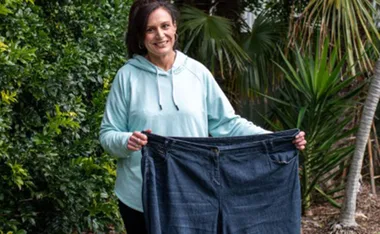You’re exercising more, keeping a food diary and cutting back on your favourite treats, but still the number on the scales doesn’t seem to be budging. Sound familiar?
Unfortunately, sometimes the strategies you think should be helping you lose weight are the ones that are sabotaging your success. Nutritionist and exercise physiologist Caitlin Reid reveals the top four reasons why you can’t lose weight.
1. You drink your kilojoules
Large lattes, super-sized soft drinks, jumbo juices and mega milkshakes all come laden with masses of kilojoules, yet many of us don’t consider this as we guzzle then down. In fact, some large juices contain more than 2500 kilojoules — the same amount of kilojoules as a meal! On top of the excess kilojoules, many of us don’t compensate for these kilojoules by eating less, meaning we end up overindulging.
Fix it: Drinks contribute to your daily kilojoule intake so make sure you choose the smallest option. Choose skim milk for hot coffees, iced coffees and milkshakes, and skip the added sugar or syrup. Stick to a standard serve of juice — it’s 125ml (or half a cup), not 600ml. Even better, eat the whole fruit for a naturally sweet, juicy and filling treat.
2. You follow your work-out with a pig-out
Finished your work-out and about to dive into your favourite piece of cake? You may want to think again as eating whatever you like after a work-out can easily undo all your hard work. According to research published in the journal Exercise and Sport Sciences Reviews, while we do burn more kilojoules when exercising, a work-out doesn’t mean we have a greater ability to burn fat over the next 24 hours. In other words, a work-out doesn’t give you a licence to eat whatever you want.
Fix it: While exercise does help you burn off kilojoules, you still need to make sure you’re balancing your energy in and your energy out. To put things in perspective, a 60kg woman running for 30 minutes burns 1200 kilojoules, which is equivalent to a handful of nuts and a piece of fruit, not an extra meal.
3. You always eat low-fat products
Low fat doesn’t mean kilojoule free, with some low-fat products containing the same amount of kilojoules (if not more) as the original version. Many processed low-fat foods have extra sugar added to them to make sure they still taste good. This means you won’t be saving any kilojoules.
Fix it: Read the nutrition information panel and compare the low-fat variety to the regular product to see if you’re actually saving on kilojoules.
4. You’re lacking sleep
A lack of sleep disrupts your internal body clock and plays havoc with your hormones, causing a decrease in the hunger-suppressing hormone leptin and an increase in the hunger-promoting hormone ghrelin. These hormone changes have been found to increase kilojoule intake the following day, promoting weight gain. Less sleep also means you have more time to overeat.
Fix it: Aim to get between seven and eight hours of sleep each night, and remember that good quality sleep is just as important as quantity. Make sure your bedroom is cool, quiet and comfortable.
Don’t get discouraged
Don’t give up if your first attempt at weight loss isn’t successful. Weight loss revolves around all aspects of your lifestyle — diet, exercise, sleep, stress. The trick is to never give up, even when you mess up.










